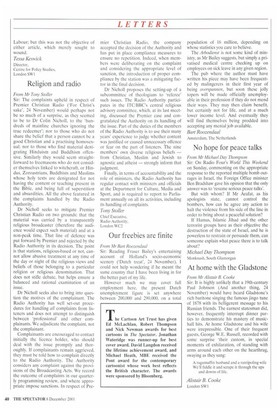Religion and radio
From Mr Tony Stoller Sir: The complaints upheld in respect of Premier Christian Radio (Tor Christ's sake', 24 November) would perhaps not be so much of a surprise, as they seemed to be to Dr Colin Nicholl, to the 'hundreds of mainline churches ignoring the true redeemer'; nor to those who do not share the belief that a person cannot be a good Christian and a practising homosexual; nor to those who find material denigrating Hinduism and Buddhism offensive. Similarly they would seem straightforward to freemasons who do not consider themselves linked to witchcraft, or Hindus, Zoroastrians, Buddhists and Muslims whose holy texts are denigrated for not having the content or teaching present in the Bible, and being full of superstition and absurdities. All the above featured in the complaints handled by the Radio Authority.
Dr Nicholl seeks to mitigate Premier Christian Radio on two grounds: that the material was carried by a transparently religious broadcaster (therefore the audience would expect such material) and at a non-peak time. That line of defence was put forward by Premier and rejected by the Radio Authority in its decision. The point is that stations, religious-based or not, cannot allow abusive treatment at any time of the day or night of the religious views and beliefs of those belonging to a particular religion or religious denomination. That does not stifle debate, but helps ensure a balanced and rational examination of an issue.
Dr Nicholl seeks also to bring into question the motives of the complainant. The Radio Authority has well set-out procedures for handling all complaints from listeners and does not attempt to distinguish between 'professional' and other complainants. We adjudicate the complaint, not the complainant.
Complainants are encouraged to contact initially the licence holder, who should deal with the issue promptly and thoroughly. If complainants remain aggrieved, they must be told how to complain directly to the Radio Authority. The Authority considers any complaint against the provisions of the Broadcasting Acts. We record the outcome of complaints in our quarterly programming review, and where appropriate impose sanctions. In respect of Pre mier Christian Radio, the company accepted the decision of the Authority and has put in place compliance measures to ensure no repetition. Indeed, when members were deliberating on the complaint and considering the appropriate level of sanction, the introduction of proper compliance by the station was a mitigating factor in the final decision.
Dr Nicholl proposes the setting-up of a subcommittee of theologians to 'referee' such issues. The Radio Authority participates in the ITC/BBC's central religious advisory committee, which, at its last meeting, discussed the Premier case and congratulated the Authority on its handling of the issue. Part of the duties of the members of the Radio Authority is to use their many years' experience to judge whether content was justified or caused unnecessary offence or fear on the part of listeners. The nine members' own diverse religious beliefs — from Christian, Muslim and Jewish to agnostic and atheist — strongly inform that judgment.
Finally, in terms of accountability and the role of ministers, the Radio Authority has regular contact with ministers and officials at the Department for Culture. Media and Sport, and is required to report to Parliament annually on all its activities, including its handling of complaints.
Tony Stoller
Chief Executive, Radio Authority, London WC2






















































































 Previous page
Previous page